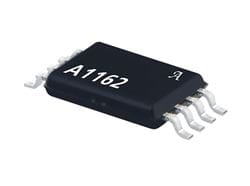Allegro MicroSystems, LLC Announces New Programmable Unipolar Hall-Effect Switch With Built In Diagnostics

Designed with an Externally Enabled Diagnostic Function and User-Programmable Switchpoints
Allegro MicroSystems, LLC announces a new unipolar Hall-effect switch with an externally enabled diagnostic function and user-programmable switchpoints. Allegro’s A1162 has on-chip electromagnetic coils that are used to implement self-test of the sensor’s entire magnetic and electrical signal chain. It is designed for systems where precise magnet switchpoints and safety, reliability, or both, are critical, such as those designed to meet the requirements of ISO 26262. In normal operating mode, the A1162 functions as a standard unipolar Hall-effect switch. The device output transistor turns on (output signal switches low) in the presence of sufficient magnetic field (>BOP max). The output transistor of the A1162 switches off (output signal switches high) when the magnetic field is removed (<BRP min). Key automotive applications include shift selectors (PRNDL), seat belt buckles and brake sensors.
When the diagnostic feature is enabled, the output of the A1162 provides a square wave output which confirms the device is properly sensing the internally generated magnetic field.Therefore, use of the A1162 either eliminates the need for redundant sensors in safety-critical applications or increases robustness in safety-critical applications that might otherwise require redundant sensors (drive-by-wire systems, etc.).
This monolithic IC integrates a voltage regulator, Hall voltage generator, small-signal amplifier, chopper stabilization, Schmitt trigger, and short-circuit-protected open-collector output able to sink up to 25 mA. The on-board regulator permits operation with supply voltages of 3.8 to 24 V. It is temperature-stable and stress-resistant, making it especially suited for operation over temperature ranges up to 150ºC (L temperature range). Superior high-temperature performance is made possible through advanced dynamic offset cancellation techniques, which reduce the residual offset voltage normally caused by device overmolding, temperature dependencies, and thermal stress.
